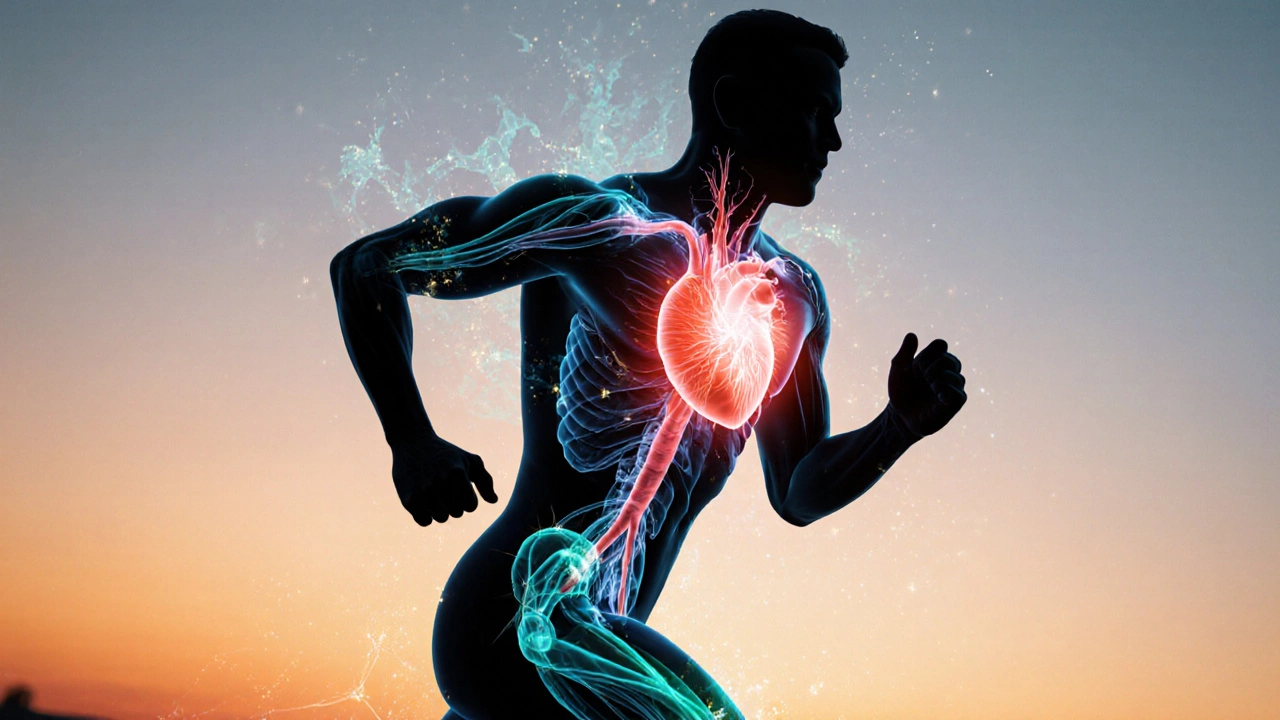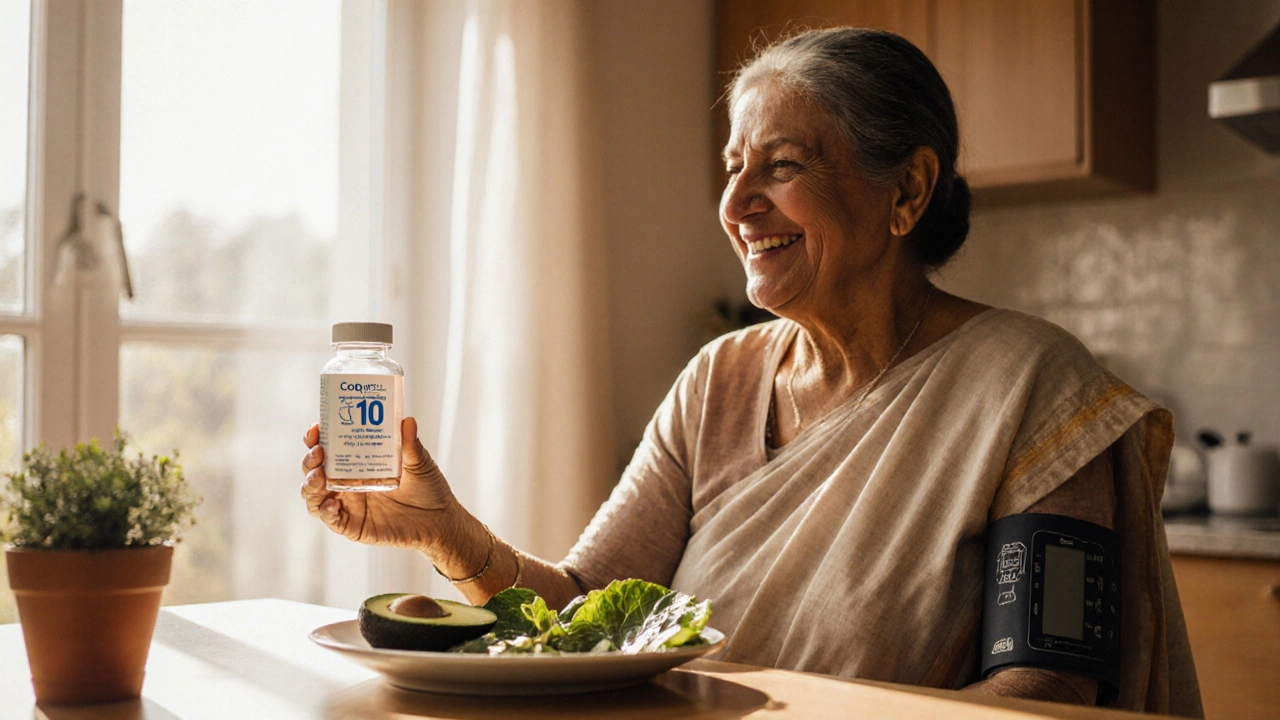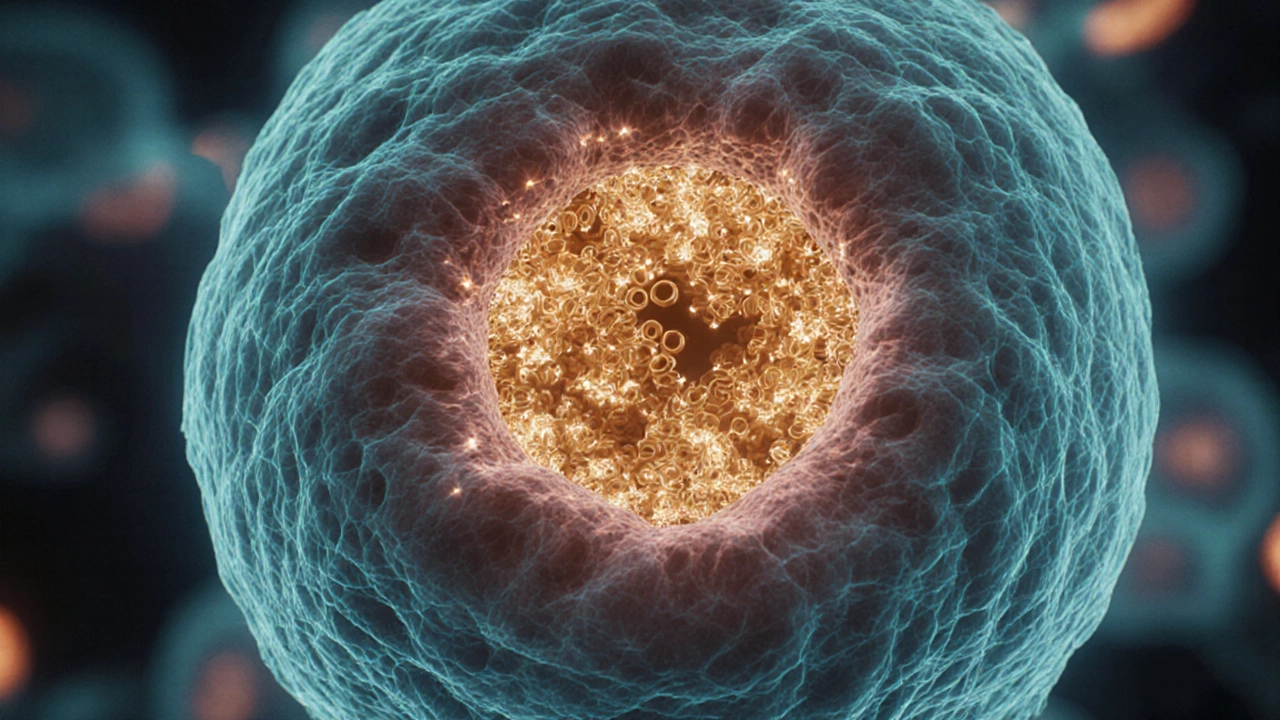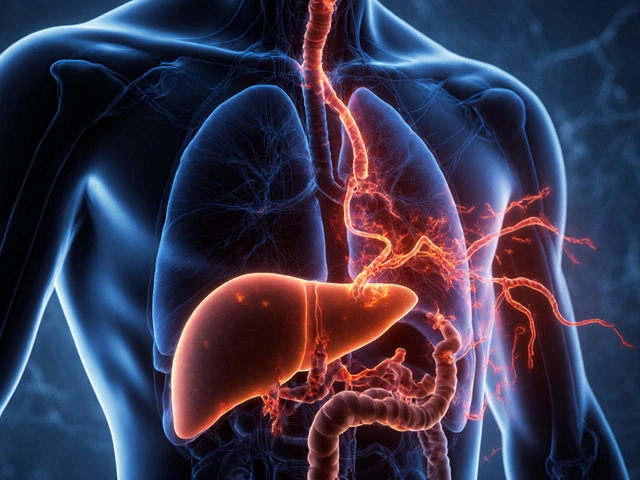CoQ10 Supplement Calculator
This tool estimates your recommended daily CoQ10 intake based on your age, health status, and lifestyle factors. Results are for informational purposes only and should not replace medical advice.
Recommended Daily Dosage:
When you see CoQ10 is a fat‑soluble antioxidant naturally produced in every cell, especially in the mitochondria where it fuels the energy‑making process. you might wonder why the supplement market pushes it so hard. The short answer: it plays a starring role in energy production, fights oxidative damage, and supports several organs that keep you feeling sharp and active. Below we break down the real‑world ways CoQ10 can boost your body, the science behind each claim, and practical tips for getting the most out of it.
How CoQ10 Powers Your Cells
The molecule you’ll hear called CoQ10 is also known as ubiquinone, a form that circulates in the bloodstream, and as ubiquinol when it’s in its active, reduced state. Inside the mitochondria, ubiquinone acts like a tiny battery, shuttling electrons during the production of ATP - the fuel every muscle, brain cell, and organ needs to perform.
Key Health Areas Where CoQ10 Shines
- Heart Health: The heart consumes the most ATP of any organ. Studies on patients with congestive heart failure show that adding 200mg of CoQ10 daily can improve ejection fraction by up to 10% and reduce symptoms like shortness of breath.
- Blood Pressure Regulation: CoQ10 helps relax blood vessels by enhancing nitric‑oxide availability. Clinical trials report an average systolic drop of 5-7mmHg, comparable to a low‑dose ACE inhibitor.
- Statin‑Induced Muscle Pain: Statins lower cholesterol but also deplete the body’s natural CoQ10 stores, leading to myalgia. Supplementing 100-300mg per day often eases discomfort within weeks.
- Skin Aging: As an antioxidant, CoQ10 neutralizes free radicals that break down collagen. Topical creams containing 0.3% CoQ10 have demonstrated a noticeable reduction in wrinkle depth after 12weeks.
- Exercise Performance: Athletes taking 100mg of CoQ10 before training report higher VO₂ max and less perceived fatigue, thanks to more efficient mitochondrial ATP output.
When Your Body Might Need Extra CoQ10
Even though every healthy adult makes CoQ10, certain conditions and life stages drain the supply:
- Age - levels drop roughly 1% per year after the 30s.
- Heavy physical activity or endurance training.
- Use of statin drugs for cholesterol management.
- Chronic diseases like heart failure, hypertension, and neurodegenerative disorders.
- High‑stress environments that increase oxidative stress.
If you fall into any of these categories, a daily supplement can help restore balance.

Choosing the Right Form and Dosage
Two main forms dominate the market:
- Ubiquinone - the oxidized version; cheaper, works well for most adults.
- Ubiquinol - the reduced, active form; better absorbed, ideal for seniors or people with absorption issues.
Typical dosages range from 100mg to 300mg per day, taken with a meal containing fat to improve absorption. For heart‑related goals, studies often use 200mg split into two doses. Always start low, monitor how you feel, and adjust upward if needed.
Safety, Interactions, and Common Myths
CoQ10 is generally safe, with mild side effects like stomach upset in less than 5% of users. However, keep these points in mind:
- It may lower blood pressure, so if you’re already on antihypertensives, watch for dizziness.
- Because it can affect blood clotting, discuss with your doctor before surgery.
- Some claim CoQ10 can cure cancer. While laboratory studies show it can boost chemotherapy efficacy, there’s no evidence it works as a stand‑alone cure.
How to Incorporate CoQ10 Into Daily Life
Here’s a quick cheat‑sheet you can copy‑paste into your routine:
- Pick a high‑quality brand that lists the exact amount of ubiquinone or ubiquinol per capsule.
- Take your dose with breakfast or lunch - the dietary fat helps absorption.
- If you’re on statins, schedule the supplement 30 minutes after the statin dose.
- Track energy levels, joint comfort, and blood pressure for at least four weeks.
- Reassess with a health professional; you may need to adjust the dose.

CoQ10 vs. Other Antioxidants
| Attribute | CoQ10 | VitaminE | VitaminC |
|---|---|---|---|
| Primary Role | Cellular energy & membrane protection | Lipid‑soluble free‑radical scavenger | Water‑soluble free‑radical scavenger |
| Key Benefits | Heart support, muscle health, skin aging | Skin health, immune modulation | Immune boost, collagen synthesis |
| Typical Daily Dose | 100-300mg | 15mg (22IU) | 75-200mg |
| Absorption Factors | Requires dietary fat | Better with fat | Water‑soluble, less dependent on fat |
While all three fight oxidative stress, CoQ10 stands out for its direct impact on energy production, making it the go‑to choice for heart‑related and performance‑related goals. That’s why CoQ10 benefits often top the list of supplement priorities for active adults.
Bottom Line: Is CoQ10 Worth Adding?
If you’re over 40, on statins, dealing with high blood pressure, or simply want to feel more energetic during workouts, CoQ10 offers a low‑risk, evidence‑backed boost. The key is to choose the right form, pair it with a fatty meal, and monitor how you feel over a month.
Frequently Asked Questions
What is the difference between ubiquinone and ubiquinol?
Ubiquinone is the oxidized, stable form of CoQ10 found in most supplements. Ubiquinol is the reduced, active form that the body uses directly in the mitochondria. Ubiquinol is absorbed about 2‑3 times better, making it a better choice for older adults or anyone with digestive issues.
Can I take CoQ10 with my blood pressure medication?
Yes, most people can combine them, but because CoQ10 may lower blood pressure further, it’s wise to check your readings after a week and talk to your doctor if you notice dizziness.
How long does it take to feel the effects?
Energy and exercise benefits often appear within 2‑3 weeks, while heart‑function improvements may need 8‑12 weeks of consistent dosing.
Is CoQ10 safe for pregnant or breastfeeding women?
Research is limited, so most clinicians advise sticking to dietary sources (like oily fish or organ meats) rather than high‑dose supplements during pregnancy.
Can I get enough CoQ10 from food alone?
Typical diets provide about 3-6mg per day, far below the therapeutic range of 100-300mg. Foods like beef heart, sardines, and peanuts contain the most, but supplementation is usually needed for the health goals discussed.





